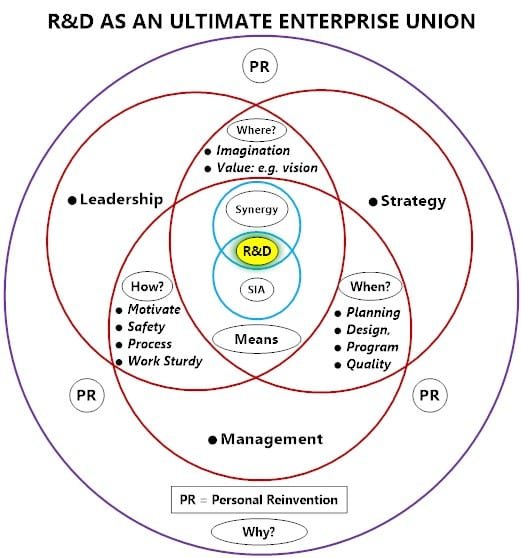
🔬 Research & Development (R&D)
The Empowering Compass of the Ultimate Enterprise
“No research without action, no action without research.” — Kurt Lewin
Why R&D Matters?
Research and development is vital for innovation. In the Ultimate Enterprise Model, R&D drives progress across personal reinvention, leadership, management, strategy, synergy, and social consciousness. Without R&D, growth stalls; with it, growth accelerates.
🧭 Like a vehicle’s steering system, R&D ensures your enterprise stays directionally sound and future-ready. Proper execution transforms businesses into dynamic, compass-driven entities.
📊 Figure 1: R&D at the Core
A visual showing R&D at the center, connected to all other UE links.
Figure-1: Research and Development
R&D is applicable to the six remaining linkages as an Ultimate Enterprise union. It serves as UE Influence’s hinge.

Defining R&D
R&D involves systematically pursuing knowledge and transforming it into practical innovations. It aims to discover, apply, create value, and align with business goals.
✳️ Core Definitions:
Research “acquiring new knowledge and understanding”—Al” C. Endres citing Roussel et al.1
Development: “Applying scientific knowledge to provide goods and services aligned with the organization’s mission.”—Al” C. Endres citing Roussel et al
🎯 Purpose of Research (University of Bradford, via Collins & Hussey):2
- Review existing knowledge
- Investigate real-world problems
- Provide practical solutions
- Explore emerging issues
- Build new systems or frameworks
- Explain novel phenomena
- Generate transformative knowledge
R&D is a strategic necessity for continuous relevance, reinvention, and impact.
📚 Layers of Research (Al C. Endres via Industrial Research Institute3)
| Type | Purpose | Characteristics |
| Basic (Fundamental) Research | Advance human knowledge | Experimental, theoretical, exploratory |
| Directed Basic (Exploratory) Research | Align research with business futures | Potentially commercial, strategically guided |
| Applied Research | Solve specific problems | Product, process, or service-specific |
| Development | Transform ideas into solutions | Prototype building, system design, product testing |
R&D in the UE Model:
Every Link Needs Research: Each Ultimate Enterprise Link—excluding R&D itself—depends on it for innovation, adaptation, and sustainability.
- Personal Reinvention: Requires cognitive and emotional self-research
- Leadership: Thrives on psychological and social research
- Management: Demands systems thinking and operational innovation
- Strategy: Relies on trend research and predictive analytics
- Synergy: Develops through research on team dynamics and technologies
- Social Consciousness: Evolves through socio-economic and ethical research
Final Thought:
To effectively navigate uncertainty, empower your enterprise with relentless curiosity and structured development. R&D is essential to long-term success—transforming ideas into solutions, data into decisions, and vision into achievement.
Join us at Spiral Influensa—where research is not merely a phase but a philosophy of progress
- Al C. Endres: JURAN’S QUALITY HANDBOOK, 5th Edition, in Joseph M. Juran and A. Blanton Godfrey (Edts) ©1999 by The McGraw-Hill Companies, ↩︎
- Bradford University School of Management, Introduction to research and research methods, accessed from http://www.brad.ac.uk/management/media/management/els/Introduction-to-Research-and-Research-Methods.pdf on May 1, 2014. ↩︎
- Industrial Research Institute Industrial Research and Development Facts, ©1996 Industrial Research Institute, Washington, DC ↩︎
